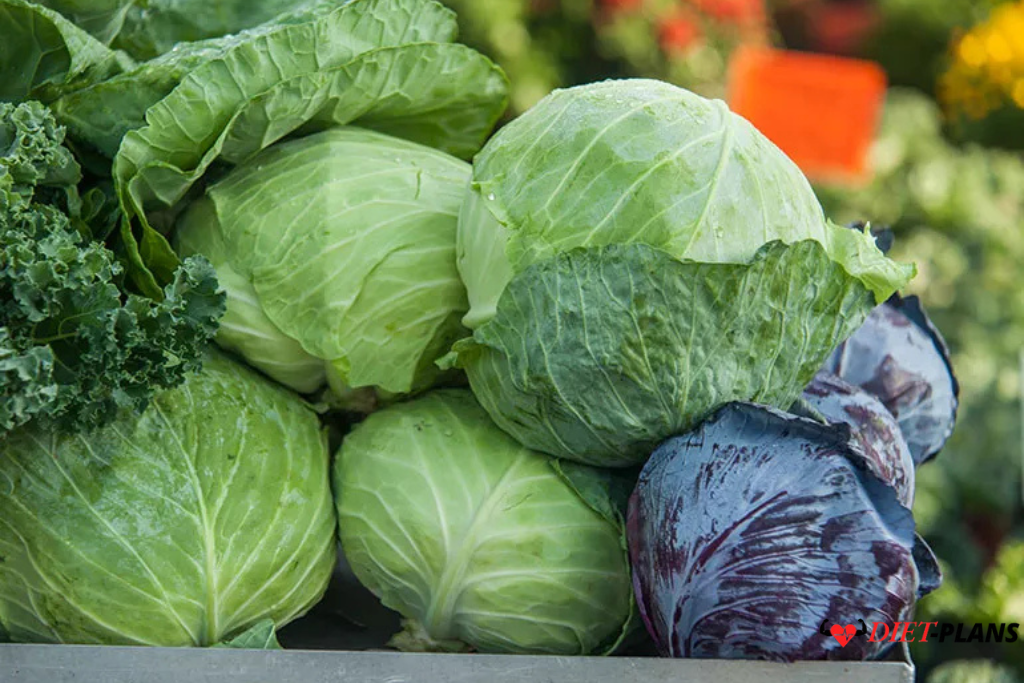Eight Health Benefits of Cabbage That Prove Why You Should Include It in Your Diet
You’re not the only one who has forgotten to buy cabbage at the grocery store. Despite being related to popular vegetables like cauliflower and kale, this cruciferous vegetable has a negative reputation due to its bland flavor and unpleasant smell when cooked. However, since cabbage is packed with vital nutrients, it truly deserves to shine in your meals. Unconvinced? Keep reading to discover the many health benefits of cabbage and strategies to increase your intake of this underrated veggie.
Nutritional Information for Cabbage
A cup of shredded raw cabbage contains around 17.5 calories, 4 grams of carbs, less than 1 gram of protein, 1.8 grams of fiber, and 2.2 grams of natural sugars, according to the USDA.
This cruciferous vegetable is also rich in vitamins, minerals, folate, zinc, potassium, calcium, vitamin C, and vitamin K, which contribute significantly to the health benefits of cabbage.
The Health Benefits of Cabbage
1. Reduces Oxidative Stress
Consuming cabbage provides a wealth of antioxidants, which are substances that protect your cells from oxidative damage. High concentrations of free radicals can harm cells and alter DNA, leading to oxidative stress. This stress is linked to long-term illnesses like diabetes, cancer, and heart disease. Antioxidants in cabbage, particularly glucosinolates and polyphenols, neutralize these free radicals. Red cabbage, in particular, contains anthocyanins, potent antioxidants responsible for its reddish-purple color, which help protect the body from oxidative stress.
2. Lessens Inflammation
The antioxidants found in cabbage reduce inflammation by combating oxidative stress. Since inflammation and oxidative stress are interconnected, cabbage’s antioxidants work together to decrease both. Sulforaphane, a compound in cabbage, plays a significant role in reducing inflammation by affecting the body’s pro-inflammatory pathways. This substance can also influence anti-inflammatory genes, reducing pre-inflammatory proteins, and alleviating symptoms of chronic conditions like arthritis, cognitive impairments, and even cancer.
3. Boosts Immunity
Increase your cabbage intake for a natural immunity boost. Cabbage is an excellent source of vitamin C, an essential nutrient that supports your body’s defense system by stimulating the production of white blood cells, which are critical in fighting infections. Vitamin C also acts as an antioxidant, defending the immune system against harmful free radicals. A cup of red cabbage contains approximately 40 milligrams of vitamin C, which exceeds half of the recommended daily intake for women (75 milligrams). Additionally, cabbage provides vitamin A, zinc, and other essential minerals that contribute to a stronger immune system.
4. Promotes Eye Health
Cabbage benefits your eyes by containing lutein and zeaxanthin, both antioxidants that protect your eyes from harmful ultraviolet (UV) light. UV light can damage the retina, leading to age-related macular degeneration and other vision issues. These antioxidants help safeguard the retina and reduce the risk of eye problems caused by oxidative stress from UV exposure.
5. Supports Gut Health
Cabbage is rich in fiber, an essential nutrient for digestive health. It contains both soluble and insoluble fiber, both of which play key roles in maintaining gut health. Soluble fiber acts as a prebiotic, feeding beneficial bacteria in the digestive tract, while insoluble fiber helps alleviate constipation and promotes regular bowel movements. Together, these fibers work to create a healthier gut microbiome, ensuring optimal digestion.
6. Heart Health Benefits of Cabbage
Cabbage is heart-healthy, thanks to its soluble fiber content. Soluble fiber helps remove cholesterol from the body, reducing blood cholesterol levels and decreasing the risk of heart disease. Cabbage also contains potassium, which helps regulate blood pressure by relaxing blood vessels and counteracting the effects of sodium. Antioxidants in cabbage further protect the heart by reducing oxidative stress and inflammation, both of which contribute to cardiovascular disease.
7. Strengthens Bones
Cabbage provides a significant amount of vitamin K, a nutrient vital for bone health. Vitamin K helps the body absorb calcium, the key mineral needed to build strong bones. This nutrient also aids in the production of bone proteins, helping maintain bone density and reduce the risk of fractures. Regular cabbage consumption can contribute to better bone health and a lower likelihood of osteoporosis.
8. Essential Nutrients for Pregnant Individuals
Cabbage offers a healthy dose of folate (vitamin B9), which is crucial during pregnancy. Folate plays a vital role in the formation of red and white blood cells and is essential for the development of the baby’s central nervous system. Adequate folate intake helps prevent neural tube defects, and significant birth defects that affect the brain, spine, or spinal cord.
Side Effects & Risks of Eating Cabbage
Cabbage is generally safe for most people, but there are a few exceptions. If you are taking blood-thinning medications, the vitamin K in cabbage may interfere with your medication, so it’s important to consult your doctor. Additionally, if you’ve never eaten cabbage before and have a history of food allergies, especially to cruciferous vegetables, be cautious. If you’re unsure, it’s best to speak with your healthcare provider before incorporating cabbage into your diet.
Some individuals may also find it difficult to digest cabbage, particularly when it’s raw. This is due to its indigestible carbohydrates, which can ferment in the stomach, causing gas or bloating. If you’re prone to digestive issues, start with a small amount of cabbage and gradually increase your intake. Cooking cabbage may also make it easier to digest.
The health benefits of cabbage are numerous, ranging from improved immunity to better heart health, digestion, and more. By incorporating this powerful vegetable into your meals, you can enjoy its nutritional advantages and enhance your overall health. So, next time you’re at the grocery store, don’t forget to pick up some cabbage—it’s truly worth more than it’s given credit for!

